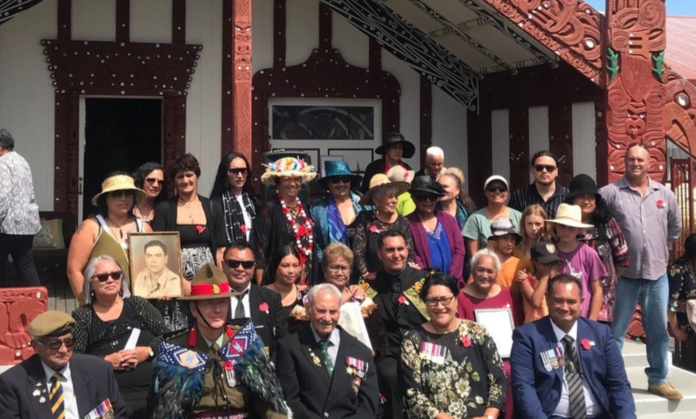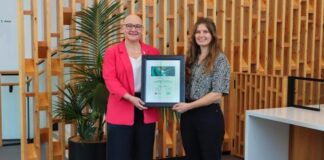The families of four Hawke’s Bay Maori Battalion soldiers who fought in World War II have been given their original war medals – 75 years after they returned home.
The extended families of James Keefe, Mihaere Karekare, Walter Rowlands and Haeata Eria were presented with the medals in what was described as an emotional and outstanding event at Houngarea Marae in Pakipaki, Hawkes Bay.
The event was organised by lawyer David Stone from Pakipaki, who currently resides in Auckland.
Mr Stone said he became involved after he researched his great uncle’s war record.
“He was killed in Italy during the war and buried there, but his family hadn’t received his medals. I realised other families must be in the same situation.”
The New Zealand Government’s official position after World War II was that service people or their families needed to apply for their medals following their service, and they would be posted to the applicant. This was to avoid the First World War problems when more than a third of medals issued were returned because of current address issues.
Some who served did not claim their medals, for a variety of reasons.
NZDF Personnel Archives and Medals worked with Mr Stone regarding the unclaimed medals of C Coy 28 (Maori) Battalion members, where more than 900 records were checked, with 137 medals found to be unclaimed – or 15%.
Mr Stone released information of unclaimed medals via social media and helped family members complete their applications.
Colonel Karl Cummins represented the New Zealand Army at the Hawkes Bay event.
“I felt honoured to be part of the presentation. The men of the 28th played a vital role in the war,” said Col Cummins.
“Operational medals are an important part of a person’s service, and it is fitting that the families of these men receive what they earned.”
Mr Henare O’Keefe, the son of 28 (Maori) Battalion soldier James Keefe (who changed the spelling of his name as was often the practice in the 1920s) attended the Pakipaki presentation after marching from Mihiroa to the marae with his extended family.
“It was an outstanding event. Very emotional and… comforting. When the serial numbers were called out, boy it got to me. And then to hear my dad’s name called out. Somehow I could just see him there fighting in the war,” he said.
He described his father as an Irish Māori.
“His mum was Ngāti Kahungunu, and his dad was Irish, hence the surname. He took the ‘O’ off but we put it back again.”
His father was born near Wairoa, and spent his life on the East Coast.
Mr O’Keefe and his whānau were presented with two medals. Their father had already received two others medals but their whereabouts is unknown.
He said the order of service was that one person would step forward to receive the medals.
“But we all went up, we were so proud!” he said.
The medals are being held by his eldest sister Kate who was not able to attend the ceremony.
Mr O’Keefe said the work put into the research by Mr Stone was outstanding and was done as a personal project.
More medals will be presented to the families of 28 (Maori) Battalion members in Gisborne this week.
At this stage about 65 families of the 134 identified are being presented with the medals, including three wives of men from the Maori Battalion.
Mr Stone said the Pakipaki presentation was a good example of what can be achieved when the Crown and Māori work together and that the kaupapa was always about “doing the right thing”.
“My grandfather was at a conference at Massey University in the mid 90s. He told me that the hui was about the Maori Battalion and during it a photo of his brother came up on the screen. He said he got up and did a mihi but also broke down crying for his brother. This was 50 years after his brother had died in the war,” he said.
“I realised that despite the passage of time he had never had the opportunity to really say goodbye, and to let his brother go. I also realised that if my grandfather still felt this way, then most likely hundreds of other siblings, if not thousands, still felt exactly the same way.
“So part of me was hoping that for those families, this presentation (and the presentations to come) may provide those families, including the wives, siblings and children an opportunity to say goodbye, and to close the book and move on.”



